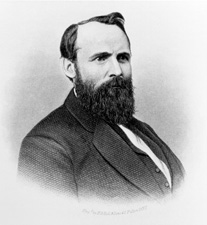Ozora P. Stearns facts for kids
Quick facts for kids
Ozora Pierson Stearns
|
|
|---|---|
 |
|
| United States Senator from Minnesota |
|
| In office January 23, 1871 – March 4, 1871 |
|
| Preceded by | William Windom |
| Succeeded by | William Windom |
| Mayor of Rochester | |
| In office 1866–1868 |
|
| Preceded by | J. V. Daniels |
| Succeeded by | Daniel Heaney |
| County Attorney of Olmsted County | |
| In office 1861–1862 |
|
| In office 1865–1866 |
|
| Personal details | |
| Born | January 15, 1831 De Kalb, New York |
| Died | June 2, 1896 (aged 65) Pacific Beach, California |
| Political party | Republican |
| Spouse | Sarah Burger |
| Alma mater | Oberlin College University of Michigan |
| Military service | |
| Allegiance | |
| Branch/service | |
| Rank | |
| Battles/wars | American Civil War |
Ozora Pierson Stearns (born January 15, 1831 – died June 2, 1896) was an American politician and lawyer. He was a member of the Republican Party. He served as a US Senator for the state of Minnesota for a short time. Before that, he was the mayor of Rochester, Minnesota and a county attorney for Olmsted County. He also fought as a Colonel in the Union Army during the American Civil War.
Contents
Early Life and Education
Ozora Pierson Stearns was born on January 15, 1831, in De Kalb, New York. He was one of eleven children in his family. In 1833, when he was just two years old, his family moved to Madison, Ohio.
College and Law School
Ozora Stearns went to Oberlin College. He then graduated from the University of Michigan in 1858. He continued his studies there and earned a law degree in 1860. That same year, he was allowed to practice law and started his career in Rochester, Minnesota.
A Career in Law and Politics
Ozora Stearns had an active career in both law and public service.
Serving as a County Attorney and Mayor
In 1861, Stearns was elected as the prosecuting attorney for Olmsted County, Minnesota. This job meant he was responsible for bringing legal cases against people accused of crimes. Later, he became the mayor of Rochester, Minnesota, serving from 1866 to 1868.
Fighting in the Civil War
Stearns also played a part in the American Civil War. He served in the Union Army. He started as a first lieutenant in the 9th Minnesota Volunteer Infantry Regiment. Later, he became a Colonel and led the 39th United States Colored Infantry. He led this regiment during the Battle of the Crater on July 30, 1864.
Becoming a US Senator
On January 18, 1871, Stearns was chosen as a Republican to be a US Senator for Minnesota. He filled a spot that became empty when another Senator passed away. He served in the 41st Congress for a short time, from January 23, 1871, to March 4, 1871.
Life as a Judge in Duluth
In 1872, Stearns moved to Duluth, Minnesota. He continued his law career there. In 1874, Governor Cushman Kellogg Davis appointed him as a judge for Minnesota's eleventh judicial district. He was re-elected three times and served as a judge until 1895. Stearns once shared that when he started as a judge, there were no proper courthouses. They held court wherever they could, like in churches, stores, or schoolhouses.
Other Important Roles
Besides his work as a judge, Stearns held other important positions. He was a regent (a governing board member) for the University of Minnesota from 1890 to 1895. He also served as president and treasurer of the Lakeside Land company. He was a director in several other companies, including the Duluth Electric Light and Power company and the Duluth Union National bank.
Family Life and Later Years
Ozora Stearns was married to Sarah Burger Stearns. She was a very important person in Minnesota, known for being the first president of the Minnesota Woman Suffrage Association. This group worked to get women the right to vote.
In 1891, Ozora Stearns had a stroke, which affected his health. Because of this, he and Sarah moved to Pacific Beach, California, in 1894. He passed away there on June 2, 1896. His remains were cremated in Los Angeles and his ashes were buried in Forest Hill Cemetery in Duluth, Minnesota.
 | Calvin Brent |
 | Walter T. Bailey |
 | Martha Cassell Thompson |
 | Alberta Jeannette Cassell |

